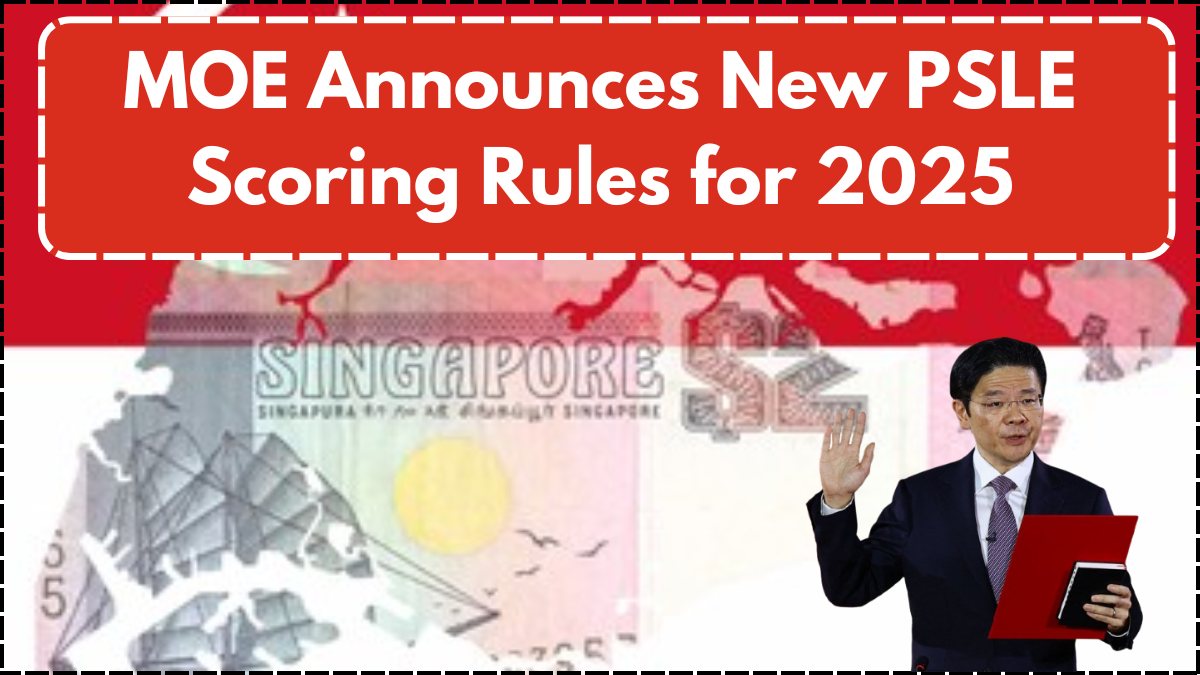In 2025, Singapore continues its transition toward a more student-centric and holistic education system with the revised PSLE scoring rules. The Ministry of Education (MOE) has shifted away from the traditional T-score method to a simplified Achievement Level (AL) framework. This shift reflects the government’s long-term goal to move past a high-stakes, competitive culture and instead emphasize individual growth and well-rounded development.

Understanding the New PSLE Scoring Structure
The core update is a change in how student performance is measured. Instead of comparing scores against peers, students are now assessed on how well they perform against established standards. Each subject is graded on an AL scale from 1 (highest) to 8 (lowest), and the sum of the four subjects gives a total PSLE score between 4 and 32.
Here’s a comparison of the old and new PSLE scoring structures:
| Component | Previous System (Pre-2021) | New PSLE System (2025) |
|---|---|---|
| Scoring Basis | T-score vs. cohort | Achievement Levels (ALs) |
| Total Score Range | 0 to 300+ | 4 (best) to 32 (lowest) |
| Grading Method | Fine-grained T-score | 8 AL bands per subject |
| School Placement | Based on aggregate T-score | Based on AL score + school choice |
This more transparent grading system reduces fine differentiation and levels the playing field for students who perform similarly.
Key MOE Updates Every Parent Should Know in 2025
Subject-Based Banding (SBB)
Subject-Based Banding continues to gain importance in 2025, allowing students to take subjects at varying difficulty levels based on their strengths and interests. This supports a more customized educational path and promotes deep learning in areas of aptitude.
Revised School Admission Criteria
Secondary school admission now considers not just the PSLE AL score, but also the order in which a student lists school preferences. This change reduces the hyper-focus on narrowly defined “cut-off points” and encourages families to choose schools that align with their child’s interests and values.
Emphasis on Holistic Development
Beyond academics, co-curricular activities (CCAs), character development, and other non-academic achievements play a greater role in shaping a student’s education. This aligns with Singapore’s ongoing “Learn for Life” movement, which prioritizes life skills such as resilience, adaptability, and empathy.
Why the PSLE Reform Was Necessary
Critics long argued that the T-score system fueled unhealthy academic pressure and did little to support balanced development. Students were often subjected to intense comparisons and high levels of anxiety due to the smallest changes in performance. The new PSLE format, by rewarding absolute rather than relative achievement, encourages mastery of content, personal growth, and emotional well-being.
In a recent update from MOE in April 2025, officials highlighted early data showing that the new system is reducing student stress and increasing satisfaction with school placements.
Tips for Parents Navigating the 2025 PSLE Transition
Supporting your child through these changes means being informed and involved. Here are a few strategies:
- Master the AL Grading Structure: Understand how each subject is scored so you can track progress and set realistic expectations.
- Align School Choices with Strengths: Start school discussions early, focusing on your child’s learning style, interests, and career aspirations.
- Prioritize Co-curricular Growth: Encourage participation in CCAs, volunteering, and creative pursuits to nurture soft skills.
- Support Mental Health: Stay in tune with your child’s emotions and keep communication open. Creating a safe space at home helps manage exam stress.
Conclusion
The revamped PSLE scoring system in 2025 represents a significant step toward a more balanced and future-ready education landscape in Singapore. With a clear focus on individual achievement, diversified strengths, and emotional wellness, these reforms aim to cultivate a generation equipped for lifelong success. Parents who understand and support these changes can better guide their children through this evolving academic journey.
FAQs About the PSLE 2025 Changes
What is the Achievement Level (AL) system?
The AL system replaces the old T-score model. It groups scores into eight levels per subject, from AL1 (best) to AL8 (lowest), providing a broader and more meaningful picture of student achievement.
How does school choice impact placement now?
School choice plays a greater role than before. Two students with the same AL score may be placed differently based on how they ranked their school preferences.
Are CCAs now important for PSLE scores?
No, CCAs do not influence the PSLE score itself but are increasingly valued in secondary school admissions and overall student development.
Is Subject-Based Banding (SBB) mandatory?
While not mandatory, SBB is widely encouraged and offered to support students learning subjects at levels best suited to their abilities.
What happens if two students have the same PSLE score?
In such cases, school choice order acts as the next deciding factor, followed by a computerized tie-break process.
Can students retake PSLE under the new system?
Yes, students who are not satisfied with their results can choose to retake the PSLE, though it’s a rare decision made case-by-case.
How does the new system reduce stress?
By eliminating narrow score comparisons, the AL system allows students to focus on their own progress rather than competing with peers.
What are the benefits of early school discussions?
Starting school choice conversations early helps families make informed, realistic decisions without last-minute pressure.
How should parents prepare their child emotionally?
Encourage open dialogue, ensure your child takes breaks, and reinforce effort over results to maintain mental well-being.
What are the key dates for PSLE 2025?
PSLE exams for 2025 are expected to follow the same timeline as previous years, with written exams beginning in late September and results released in late November.
Click here to know more.

